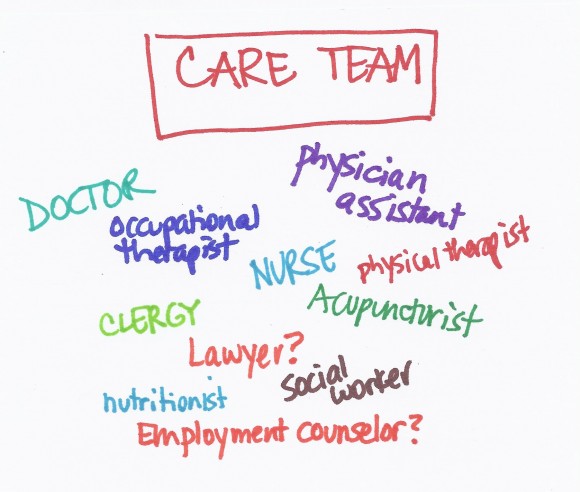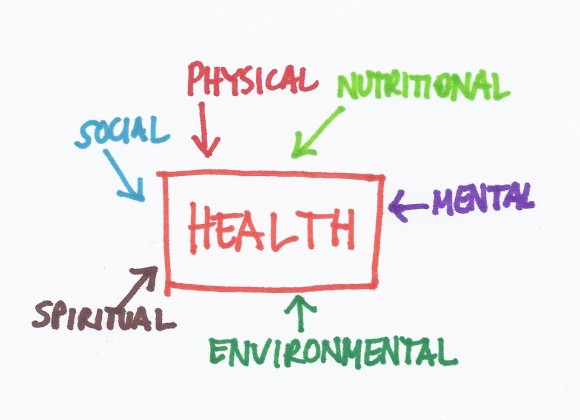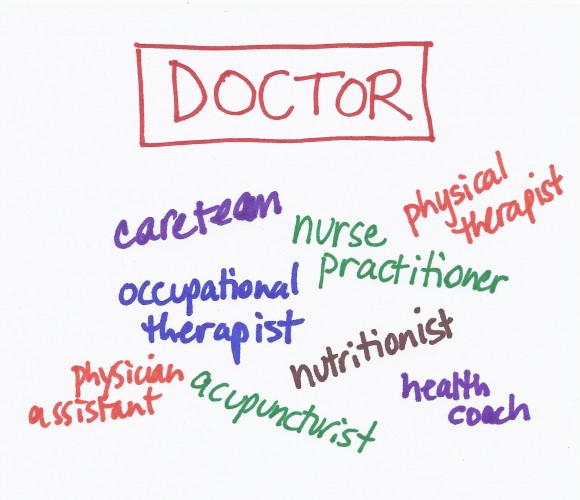Category: Doctors
The dark side of bacteria
Bacteria are our friends…but not all the time.
While I believe that we need to keep the bacteria in our bodies happy and that the improved cleanliness of modern life may be causing problems, there is also no question that bacteria are our enemies as well. You don’t have to look very far to see examples of how bacteria can cause serious illness or even death – meningococal meningitis, pneumococcal pneumonia, salmonella and tuberculosis to name a few. In most cases, antibiotics are required to treat these infections (or vaccines to prevent the infections).
Are screening tests good for you?
If we had a serious disease, we’d like to learn about it before we even had symptoms (so we could get started on treatment). And most of us would like to know if we were at risk of developing a serious disease (so we could make changes to prevent the disease). Right?
Two recent articles in the NY Times point out the problems with screening tests.
Who makes the best medical student?
As I begin my 4th year interviewing prospective medical students, I am reminded of how challenging it is to figure out which applicants will possess all of the characteristics that I would want in my own doctor.
There is little question that we need to rethink the way we educate medical students to meet the needs of a changing healthcare system. Medicine is no longer a paternalistic practice where the doctor tells the patient what to do. Not only are patients becoming more empowered to participate in the own care, but they also have information at their fingertips about their own conditions and can access online discussion groups to talk with other patients about their shared experiences. The blog Wing of Zock looks at innovative ways to redesign medical education.
Redefining the care team
 When I was in clinical practice as an infectious diseases specialist, most of my patients were very sick and hospitalized but I saw a small number of outpatients as well. They were often people who had nonspecific complaints and were convinced that they had a chronic infection that their doctors were missing. They often arrived with numerous records – laboratory tests results, x-ray reports and consultation letters from other doctors.
When I was in clinical practice as an infectious diseases specialist, most of my patients were very sick and hospitalized but I saw a small number of outpatients as well. They were often people who had nonspecific complaints and were convinced that they had a chronic infection that their doctors were missing. They often arrived with numerous records – laboratory tests results, x-ray reports and consultation letters from other doctors.
While it is certainly possible that these patients had an infectious disease that we don’t know about yet or that I had missed, many of them had significant stress in their lives – housing issues, trouble with their children or spouses, difficulites at work, etc. There is a lot of evidence that stress can lead to serious health issues including heart attacks.
The power of respect
Last week, I went to see my dermatologist for a full body check to make sure I don’t have melanoma. I showed up for my 3:00pm appointment a few minutes early and the receptionist said in a gruff voice, “You’re late. You had a 2:15 appointment. You can wait for the doctor to finish her office hours and be seen at the end of the day if you want”.
Hmmm….that was a little confusing since I had 3:00 in my calendar for many weeks – I made the appointment well in advance knowing that the dermatologist would need extra time for this type of appointment. So I told the receptionist that I thought there must be some mistake and asked if she could check again. By now she was really annoyed with me and said “No, you had a 2:15 appointment and it says right here that they tried to call you to confirm and your phone was out of service.” Now I was sure there was a misunderstanding since they had called to confirm my 3:00 appointment a few days earlier. So I asked her to please check that she had my name right. This time she said that I was correct (but did not offer an apology). She handed me some paperwork and said, in an accusing tone, that I was supposed to come every year and since I hadn’t been there in 3 years I had to fill out the medical history from scratch.
More on technology (and communication)
There is no question that technology can improve the quality of healthcare but it can’t replace the need for good communication.
Dr. Peter Pronovost, a leader in patient safety at Johns Hopkins, wrote a blog post today about how technology can help doctors make the right diagnosis. He cites alarming statistics about how the wrong diagnosis may cause as many as 80,000 deaths each year in the US. He discusses the exciting news that a portable bedside device that is able to measure eye movements, may prove to be useful in emergency rooms to figure out which patients who complain of dizziness are likely to be having a stroke. This development could save lives and also save time and money.
However, in many of the cases of misdiagnosis, the problem is that doctors don’t listen carefully to what patients and their families are saying. They forget that patients are the experts about their own symptoms. Doctors have a tendency to get locked into thinking about a particular diagnosis and may not listen to what patients (and their families) are telling them.
Technology is bad…and good
During my last year in medical school, I was sitting on a bus on a cold winter day when I realized that my finger tips felt numb. I took off my gloves and watched the color of my fingers go from white to blue to red. I knew from my studies that this was Raynaud’s phenomenon and was caused by the blood vessels in my fingers becoming narrowed (going into spasm) due to the cold. I also knew that this was a relatively common problem in women. Unfortunately, I also knew that it could be a sign of something more serious, such as lupus or rheumatoid arthritis. Medical students are known to be hypochondriacs and I went to see my physician the next day convinced that I was gravely ill. He was an incredibly warm and caring person and explained to me that he didn’t think it made sense to test for all the things it could be and that we should just see what happened over time. He reassured me and I felt better. This was doctor-patient communication at its best.
I believe strongly that the relationship between a doctor and a patient can lead to healing by itself. And there is little question that doctors have less time to listen to us than they did many years ago – in fact some studies suggest that it is as little as 7 or 8 minutes on average. And with more diagnostic tests available – specialized x-rays, CT scans, MRIs, etc – doctors are more likely to perform tests than take the time to listen to us. If they are using an electronic health record, they may seem more interested in entering information than in hearing what we have to say.
Does food cause inflammation?
I am fascinated by food – what makes us eat the food we eat and how it affects our health. I’m especially interested when there is evidence to support the ideas.
As the American diet has changed in the past few decades, we have been gaining weight. It is also true that we are seeing more diseases – especially those that have an inflammatory component. Inflammation is when the body responds to things that shouldn’t be there – like an infection or a chemical – and the body sends cells to the area to fight them off. This can lead to pain and swelling, among other things. Some diseases caused by inflammation have “itis” at the end – arthritis, colitis, bronchitis, etc.
Is it possible that the food we eat is causing some of these diseases that are due to inflammation?
The whole patient
 During my internship, I had an 18 year old patient with diabetes who I followed in my outpatient clinic (let’s call him Sam). He was first diagnosed at age 3 and had many hospitalizations thereafter for his poorly controlled diabetes. On one of these admissions, he arrived in the emergency room unconscious and near death because he hadn’t been taking his insulin. I happened to be on-call and stayed up with him all night managing his care. This required drawing blood tests every hour, adjusting medications, giving nutrients and fluids, etc. In the morning I had to present the situation to the physician in charge of my team at morning rounds. I proudly discussed how I had taken care of all of Sam’s problems throughout the night and how well he now looked. The senior physician asked me and the other interns and residents on our the team what the diagnosis was in this patient. We all looked at him like he was crazy since we had been talking about Sam’s diabetic emergency for the past 15 minutes. Then he told us that he thought the diagnosis was “communication failure”. Then we were convinced that he was crazy.
During my internship, I had an 18 year old patient with diabetes who I followed in my outpatient clinic (let’s call him Sam). He was first diagnosed at age 3 and had many hospitalizations thereafter for his poorly controlled diabetes. On one of these admissions, he arrived in the emergency room unconscious and near death because he hadn’t been taking his insulin. I happened to be on-call and stayed up with him all night managing his care. This required drawing blood tests every hour, adjusting medications, giving nutrients and fluids, etc. In the morning I had to present the situation to the physician in charge of my team at morning rounds. I proudly discussed how I had taken care of all of Sam’s problems throughout the night and how well he now looked. The senior physician asked me and the other interns and residents on our the team what the diagnosis was in this patient. We all looked at him like he was crazy since we had been talking about Sam’s diabetic emergency for the past 15 minutes. Then he told us that he thought the diagnosis was “communication failure”. Then we were convinced that he was crazy.
The Doctor
 I did my internal medicine residency at a city hospital where I knew I would have lots of autonomy and see a broad array of diseases. My coworkers and I were on-call every third night and were usually up all night. We did everything for ourselves – transporting patients from the emergency room to their hospital beds or to the x-ray department, drawing blood, etc. We were even expected to look at all of the patient’s laboratory specimens – urine, sputum, spinal fluid, etc. – under a microscope. We never asked a patient what he or she wanted – it never occurred to us that there was a choice.
I did my internal medicine residency at a city hospital where I knew I would have lots of autonomy and see a broad array of diseases. My coworkers and I were on-call every third night and were usually up all night. We did everything for ourselves – transporting patients from the emergency room to their hospital beds or to the x-ray department, drawing blood, etc. We were even expected to look at all of the patient’s laboratory specimens – urine, sputum, spinal fluid, etc. – under a microscope. We never asked a patient what he or she wanted – it never occurred to us that there was a choice.
Things are different now. It is impossible to keep up-to-date with all of the medical advances and there are now a huge number of tests available to diagnose diseases. No one person can manage all of the complexities of care so doctors have become more specialized. Medicine needs to become more of a team sport – where specialists work together as a team to help the patient. And doctors need to accept the roles of new types of care providers as team members such as physician assistants and nurse practitioners who may be especially suited to provide routine care. We also now recognize that physical therapy, occupational therapy and nutrition are integral elements of care and that stress management, acupuncture, weight loss, health coaching and numerous other interventions can improve health in certain situations. In addition to being able to work as part of a team and help coordinate the team, doctors need to recognize that the most important member of the team is the patient.